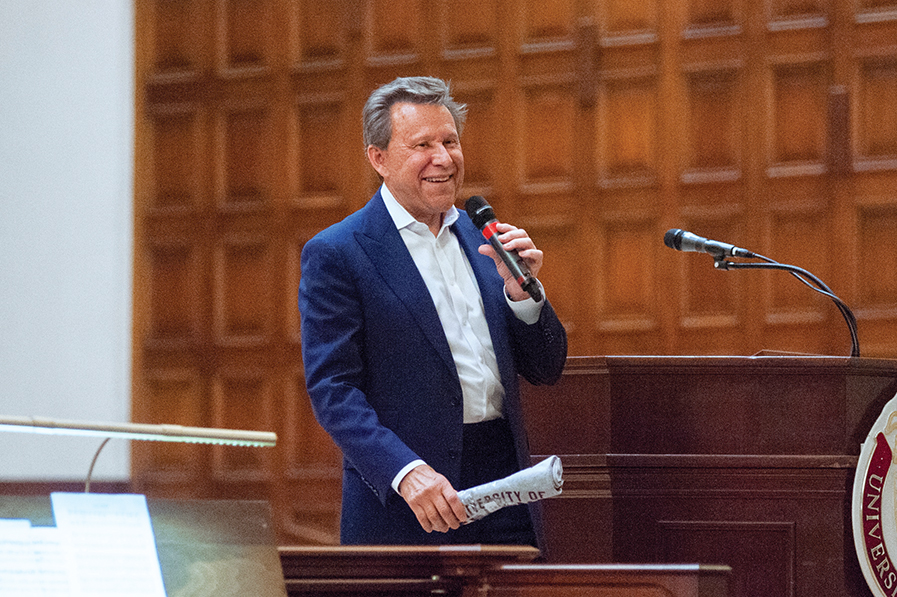University of Redlands Emergency Alert System
Alert Received: . For more information, visit: https://www.redlands.edu/alert/
University of Redlands
- Home
- Och Tamale
- Fall 2019
- Thoughts from the President's Office

One of the five foundational priorities I cited for the University of Redlands in my inauguration address was internationalization. Why do I believe internationalization is so important?
It is not just that we are located on the Pacific Rim, the gateway to Asia; or that almost 90 percent of global growth is occurring outside the U.S.; or that international and domestic politics are now entangled in unanticipated new ways.
International experiences are critical because of their long-lasting educational value. As a rule, cross-cultural experiences make people more creative, adaptable, and open to different points of view. As Mark Twain said, “Travel is fatal to prejudice, bigotry, and narrow-mindedness.”
My own trips to places such as Japan, Thailand, and Europe challenged social assumptions small and large, and introduced me to different ways of living. Instead of storing a month’s worth of food in large refrigerators, people made frequent trips to produce-laden markets and plan for a single day. Instead of eating hurriedly on public streets while headed to work, everyone expected to savor each and every meal, preferably sitting with others. Instead of the provincialism of home, one saw the inherently outward purview of others.
Five years ago, in this very magazine, I predicted a future U of R enriched by opportunities from around the world: “In 2020, a far greater proportion of College of Arts and Sciences students will be international. More and more Redlands professors and students will go into the world for service or research: Our Master of Science in Geographic Information Systems students will provide support to doctors working in rural Africa to combat AIDS, while our Fulbright scholars will teach in underserved parts of Central America.”
Here we are, on the cusp of 2020. Tomorrow has arrived. How did my predictions stand up?
Despite the headwinds of current immigration and visa policies, my forecast of a larger international student population has been amply fulfilled; the international student population of College of Arts and Sciences, while still modest by absolute standards, has increased eightfold. With this expansion, we not only provide opportunities for students whose home countries do not offer the benefits of a liberal arts education, we furnish students from this country with a peer group that can foster a worldwide perspective.
Our MS GIS students and faculty are indeed traveling the world to support healthcare practitioners and policy, although currently focusing on health threats such as diabetes and plague more than HIV-AIDS. The environment is another calling: Abby Bohman ’18, ’19 (MS GIS), for example, is part of a larger Redlands effort to monitor deforestation in Panama (see page 24).
And, as reported in the last issue of Och Tamale, our Fulbright students now number 24 over the last decade. The most recent trio, Brenna Phillips ’19, Lidya Stamper ’19, and Theo Whitcomb ’19, are teaching and researching in the Netherlands, South Africa, and India, respectively (not currently Central America, but who knows what next year will bring?).
But, in many ways, the story of U of R’s internationalization is even better than I anticipated because it has flourished broadly across multiple facets of the University, including outside our traditional undergraduate programs.
The School of Business offers robust international opportunities, enabling students like Jeremy Cruz ’18 (see page 26) to participate in a study abroad trip to England and France and to participate in a consultancy capstone project in Iceland. Professor Michael MacQueen has accompanied 10 groups of business students on cross-cultural comparative-business investigations over the past eight years.
The School of Education also has a story to tell. The School has introduced world travel for its students. In addition, it has forged a new partnership with the Hubei Oriental Insight Mental Health Institute to help meet China’s growing demand for mental health counseling professionals. These initiatives represent an amazing level of internationalization in comparison to our peers.
People often say these kinds of far-reaching experiences fundamentally transform them. The tremendous personal and professional impact on students and recent graduates can be seen in the stories in this issue (see page 20). But even decades later, alumni look back and recognize how they were changed. Alice Mozley ’70, now a life trustee, was inspired to endow the directorship of the same Salzburg program that she attended as a student 50 years ago. “Salzburg was the best thing that ever happened in my life,” she says. “Having never been outside of California, it completely changed how I viewed the world. We were in Europe during some major political events, and witnessing them firsthand was historic. While some things from those years have faded in my memory, my extraordinary time in Salzburg has stayed active in my heart and mind.”
The challenges of tomorrow will be pervasive ones for planet Earth—emerging and virulent infectious diseases know no borders; technological innovations both simplify and amplify global communications (and can create massive-scale misinformation); scarcity of alternative energy and water resources create geopolitical stresses; tariff barriers are as fractious as international borders; transnational migration and immigration stir the pots of regional politics and economies; and climate change affects the world as a whole. To meet these challenges and create the next opportunities, we will need engaged global citizens, like those we produce at the University of Redlands.
Forever yours,
Ralph W. Kuncl, PhD MD
President
University of Redlands